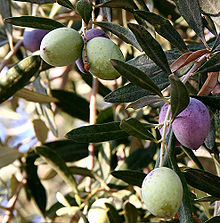
The Olive is a species of a small tree in the family Oleaceae, native to the coastal areas of the eastern Mediterranean Basin (the adjoining coastal areas of southeastern Europe, western Asia and northern Africa) as well as northern Iran at the south end of the Caspian Sea. Its fruit, also called the olive, is of major agricultural importance in the Mediterranean region as the source of olive oil. The tree and its fruit give its name to the plant family, which also includes species such as lilacs, jasmine, Forsythia and the true ash trees (Fraxinus). The word 'oil' in many languages ultimately derives from the name of the tree and its fruit.

The leafy branches of the olive tree - the olive leaf as a symbol of abundance, glory and peace - were used to crown the victors of friendly games and bloody wars. As emblems of benediction and purification, they were also ritually offered to deities and powerful figures.
Olive oil has long been considered sacred; it was used to anoint kings and athletes in ancient Greece. It was burnt in the sacred lamps of temples as well as being the "eternal flame" of the original Olympic Games. Victors in these games were crowned with its leaves. Today, it is still used in many religious ceremonies.
Over the years, the olive has been the symbol of peace, wisdom, glory, fertility, power and pureness. The olive tree and olives are mentioned over 30 times in the Bible, in both the New and Old Testaments. It is one of the first plants mentioned in the Bible, and one of the most significant. For example, it was an olive leaf that a dove brought back to Noah to demonstrate that the flood was over. The Mount of Olives east of Jerusalem is mentioned several times.
The olive tree has been cultivated for olive oil, fine wood, olive leaf, and the olive fruit.
| < Prev | Next > |
|---|
















